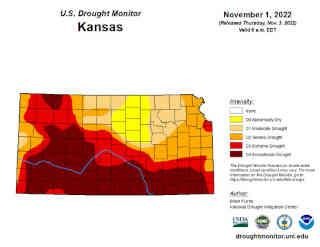By Jennifer Ifft
As of November 1, 2022, over two-thirds of all Kansas counties was reported as experiencing extreme or exceptional drought conditions (Figure 1). Cattle producers can take many actions to mitigate the impact of drought, including purchasing forage insurance, or Pasture, Rainfall, Forage (PRF) insurance. The deadline to purchase PRF for 2023 is December 1, 2022, but the premium would not be billed until September 23, 2023.
In this article, we discuss what the PRF is and report PRF payouts to-date by drought status for all 105 Kansas counties. In 2022, nearly 2.9 million acres were enrolled in PRF in Kansas; USDA reported 15.6 million acres of pastureland in Kansas in 2017. PRF premiums for 2022 totaled about $14 million and PRF has already paid out nearly $25 million in indemnities.

Figure 1. U.S. Drought Monitor for Kansas as of November 1, 2022.
What is PRF?
PRF insurance makes payments to producers with land used for hay production or grazing when precipitation levels within a producer-selected 2-month window (“interval”) are lower than the historic average. Precipitation is measured for a “grid”, which is smaller than a county; Riley County contains all or parts of 6 grids. Producers purchasing PRF make two major decisions. The first is the months during the year when they want to have PRF coverage. Specifically, producers must select at least 2 2-month intervals during the calendar year; the maximum number of intervals is 6. For example, a producer could select April/May and June/July intervals. A producer could select 6 intervals, effectively covering all intervals/months in the year. Second, producers must select a coverage level from 70-90%. A 70% coverage level pays out when precipitation is 70% less than the historic average, while a 90% coverage level pays out when precipitation is 90% less than the historic average.
Producers must pay a premium to enroll in PRF, but the Federal government covers up to 59% of the premium cost. Over time, on average PRF has paid out more indemnities than premiums. See the links at the end of this article or contact a local livestock insurance agent for more information on the risks and benefits of using PRF.
Has PRF paid out in 2022?
PRF pays out based on precipitation instead of drought status, so it is worth asking whether payouts (indemnities) were higher in counties experiencing drought. This is not a perfect comparison, as several choices producers make about their PRF coverage can influence payouts. For example, payouts are typically higher for higher coverage levels. Further, drought status may reflect cumulative precipitation and temperature as opposed to precipitation at a particular point in time. However, this comparison does provide a general idea of the degree to which PRF can make payouts during a drought. In the table below, we estimate average PRF net indemnities per acre for all 105 Kansas counties by drought status, as measured by the UNL Drought Monitor. Net indemnities are calculated as total indemnities minus total producer-paid premium. 2022 is not complete yet, indemnities are likely to increase substantially by the end of 2022.
The relative level of indemnities as of late October is strongly related to drought status in Kansas. Counties moderate drought on average paid more in premiums than indemnities. However, counties with severe to exceptional drought have positive net indemnities that are increasing in drought status. For counties with exceptional drought, average net indemnities are currently higher than $5 per acre. Experience is not uniform across all counties by drought status, but these statistics do quantify how PRF payouts tend to increase as droughts become more severe.
Table 1. Drought Status and average 2022 PRF Indemnities for Kansas counties through Nov. 9, 2022.
Drought Monitor Category | DSCI* | 2022 PRF average net indemnities per enrolled acre | # of counties | Acres enrolled in PRF |
Moderate drought | 101-200 | -0.10 | 14 | 214,000 |
Severe drought | 201-300 | $0.76 | 23 | 665,000 |
Extreme drought | 301-400 | $4.40 | 18 | 403,000 |
Exceptional drought | 401-500 | $5.12 | 50 | 1,593,000 |
*Drought Severity and Coverage Index |
Note: Data sources are USDA Risk Management Agency and https://droughtmonitor.unl.edu/. More information on the Drought Severity and Coverage Index (DSCI) is available at https://droughtmonitor.unl.edu/About/AbouttheData/DSCI.aspx. Net indemnities are calculated as total indemnities to date minus the total premium. Data was collected on November 9, 2022. The lowest DSCI for a Kansas county on Nov. 9, 2022 was 100, in 2 counties. Acres enrolled are rounded to the nearest 1,000. Indemnities are only partial and are likely to increase substantially by the end 2022.
Source : ksu.edu